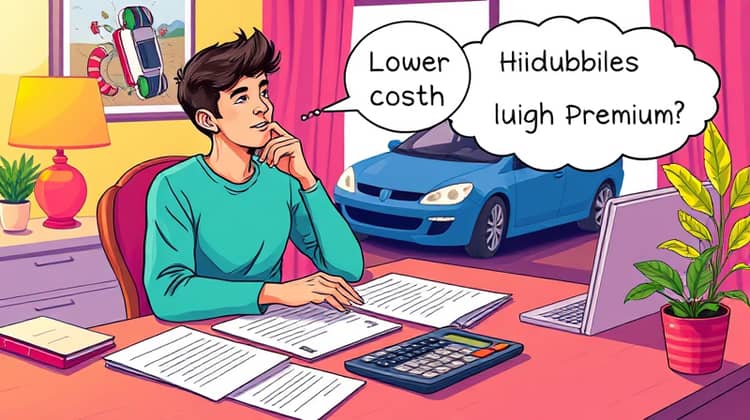Car Insurance Savings: 10 Tips to Slash Your Premiums Today

Car insurance is a significant expense for many vehicle owners, and finding ways to save on premiums is a priority for most. Fortunately, there are several strategies you can implement to help reduce your car insurance costs without sacrificing coverage. In this article, we will explore ten effective tips that can help you slash your premiums today.
By understanding the factors that influence car insurance premiums and taking proactive steps, you can not only save money but also ensure that you are adequately covered in case of an accident. Let’s dive into the details of each tip, providing you with actionable insights to take control of your car insurance expenses.
Whether you are a new driver or have years of experience behind the wheel, these tips will guide you toward making informed decisions that can lead to substantial savings. Get ready to learn how you can make your car insurance work for you.
Understanding Car Insurance Premiums

Car insurance premiums are determined by various factors, including your age, driving history, location, and the type of vehicle you own. Understanding these factors is crucial for identifying ways to lower your premium costs.
Insurers assess risk when determining your premium. For example, younger drivers may face higher premiums due to their inexperience, while individuals with clean driving records are often rewarded with lower rates.
Moreover, the type of vehicle you choose can significantly impact your insurance costs. High-performance cars and luxury vehicles typically come with higher premiums, while sedans and SUVs may be cheaper to insure.
1. Shop Around for the Best Rates

One of the most effective strategies to reduce your car insurance premiums is to shop around and compare quotes from different providers. Insurance companies have various underwriting guidelines, which can result in significant differences in price for similar coverage.
Take the time to gather multiple quotes and analyze the coverage options. Even if you have been with your current insurer for years, it’s essential not to overlook the potential savings available by exploring other options.
- Use online comparison tools to streamline the process of obtaining multiple quotes.
- Check for local agents who can provide personalized service and potentially better rates.
- Don’t hesitate to negotiate with your current insurer by presenting quotes from competing companies.
By shopping around, you might discover a better rate or improved coverage that meets your needs at a lower price.
2. Bundle Your Policies

Another great way to save on car insurance is to bundle your policies. Many insurance companies offer discounts if you purchase multiple types of insurance, such as home, renters, or life insurance, from them.
Bundling not only simplifies your finances by consolidating payments but also allows you to take advantage of lower premiums for each policy combined.
- Check with your existing insurer to see if they offer bundling discounts.
- Consider switching to a different provider that provides competitive pricing for bundled policies.
- Evaluate all your insurance needs and select a package that covers everything you need at a discounted rate.
This approach can lead to significant savings on your overall insurance costs.
3. Increase Your Deductible

Raising your deductible—the amount you pay out of pocket before insurance kicks in—can be an effective way to reduce your premium. While this means higher upfront costs in the event of a claim, the lower premium can make a significant difference in your annual costs.
Before making this decision, consider your financial situation and how much you can comfortably afford to pay in case of an accident. It’s essential to strike a balance between what you can save on your premium and what you can handle during an emergency.
- Review your current deductible options to understand the potential savings.
- Consider how often you typically file claims and whether increasing your deductible makes sense for your driving habits.
- If you're financially stable, increasing your deductible can result in considerable long-term savings.
Just make sure that the higher deductible is something you could manage comfortably if you ever needed to file a claim.
4. Improve Your Credit Score

Your credit score plays a significant role in determining your insurance premium rates. Many insurers use credit scores as a factor because studies have shown that individuals with higher credit scores tend to file fewer claims.
By improving your credit score, you may qualify for lower insurance rates. Some effective strategies to improve your credit score include paying your bills on time and maintaining low credit card balances.
- Review your credit report regularly for errors that may negatively affect your score.
- Limit new credit applications to avoid temporary drops in your credit score.
- Keep old credit cards open to maintain a longer credit history and increase your score.
Improving your credit score not only benefits your insurance premiums but can also enhance your overall financial health.
5. Drive Less, Pay Less

If you have the ability to minimize your driving, you might be able to lower your car insurance premiums. Many insurers offer discounts for low-mileage drivers, as driving less generally reduces the risk of accidents.
Consider carpooling, taking public transportation, or working from home if possible.
- Track your mileage using an app to see how much you drive each month.
- Outline a plan to reduce unnecessary trips that contribute to high mileage.
- Inform your insurer about your reduced driving habits to see if you qualify for discounts.
By reducing your time on the road, you not only cut down on fuel costs but could also see savings in your insurance premiums.
6. Maintain a Clean Driving Record

A clean driving record is one of the best ways to keep your insurance premiums low. Accidents, traffic violations, and claims can lead to premium increases, so it’s essential to practice safe driving habits.
Defensive driving courses can also help improve your driving skills, and sometimes, insurers provide discounts for completing such courses.
- Avoid distractions while driving to minimize the risk of accidents.
- Follow traffic laws and respect speed limits to maintain a clean record.
- Consider using technology, such as apps that monitor your driving habits, to help enforce safe practices.
Staying accident-free not only saves you money on insurance but also keeps you and others safe on the road.
7. Choose a Safer, More Affordable Vehicle

The type of vehicle you drive significantly impacts your insurance premium. Cars with high safety ratings, low theft rates, and good repair records typically cost less to insure, while luxury or high-performance vehicles can lead to higher premiums.
When shopping for a new vehicle, consider not just the purchase price, but also how its insurance costs will affect your overall expenses.
8. Take Advantage of Discounts

Insurance companies often provide various discounts that policyholders can take advantage of. These may include discounts for good students, safe drivers, military personnel, and more.
Always inquire about available discounts when comparing insurance quotes to ensure you are getting the best deal.
- Good driver discounts
- Multi-policy discounts
- Affiliation discounts (e.g., for AAA members, alumni, etc.)
- Low mileage discounts
- Safety feature discounts
- Student discounts for good grades
By actively seeking out and applying these discounts, you can significantly reduce your car insurance premiums.
9. Pay Your Premium Upfront

Many insurers offer a discount if you pay your premium in full rather than opting for monthly payments. Paying upfront tends to lower your overall costs because insurers prefer the reduced risk of non-payment.
If your financial situation allows it, consider paying your premium in full when first purchasing insurance or during renewals to take advantage of this discount.
10. Regularly Review and Update Your Policy

Your car insurance policy should not be static; it’s important to periodically review and update your coverage as your circumstances change. Life events such as moving, getting married, or purchasing a new vehicle can all impact your insurance needs.
Regular reviews can help ensure you're not overpaying for unnecessary coverage and that you take advantage of new discounts or policy options.
Final Thoughts

Saving on car insurance requires a combination of strategy, knowledge, and awareness of your personal circumstances. By actively managing your insurance, comparing options, and maintaining safe driving habits, you can work to significantly lower your premiums.
Implementing the tips outlined in this article will help you gain control over your car insurance costs, ensuring that you are not only adequately protected but also saving money in the process.






